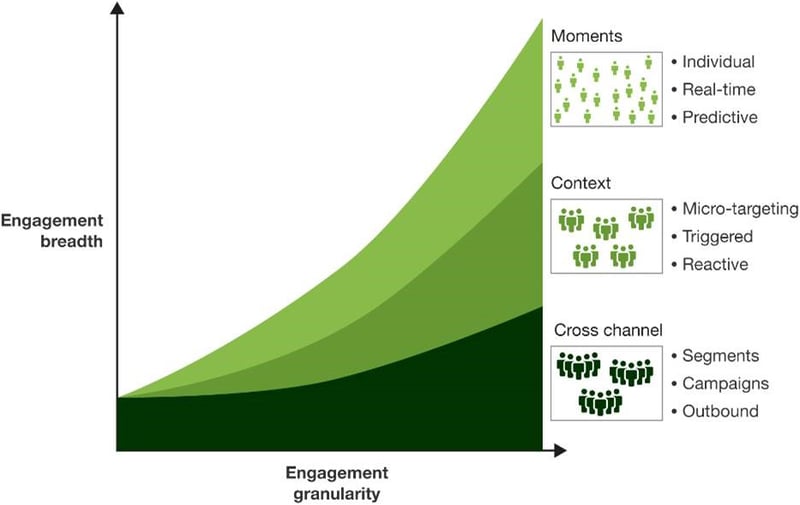True moments-based-marketing needs to happen in-the-moment
Forrester have been talking about moments-based-marketing for some time now. It’s a very appealing, common sense term which ties in well with their age of the customer rhetoric, their obsession with customer obsession and overall focus on all things CX. Transforming to a moments-based approach represents the holy grail for many organizations, in particular large enterprises.
In their most recent paper on the subject - Enable Moments-Based Marketing with Enterprise Martech (1), authors Joe Stanhope and Rusty Warner examine the demands that a moments-based approach places on the technology which marketers use to achieve their business objectives.
For marketing departments, becoming moments-based is to transform from an organization who reaches out to its public according to their corporate agenda and priorities, to one whose customer and prospect engagements are informed by an understanding of the context of individuals. Moments-based-marketing is the ultimate step in the transition from product to customer centricity.

"The Future Of Enterprise Marketing Technology", Forrester Research, Inc., June 6, 2019
The essence of moments-based- marketing is the ability to engage with hyper relevant content or interactions, on the most appropriate channel. At first glance this may sound like 'conventional' personalization, but moments-based-marketing goes above and beyond this concept. Personalization generally involves identifying and profiling an individual and using this data to select the most appropriate content and engagement options within the confines of a pre-planned campaign or digital channel experience. In practice this broad-brush approach often amounts to little more than crude segmentation in which rudimentary characteristics within a customer profile (e.g. a history of purchasing a particular product, or an individual’s date of birth) are used to determine when to send campaign materials, or which one-to-many campaign materials are to be selected. The results of these attempts to personalize marketing rarely leave the recipient with the impression that the company truly understands them and can actually be worse for customer engagement than one-size fits-all mass marketing campaigns. Todays consumers are simply too savvy to be taken in by these fake personalization attempts and the deception doesn’t sit well with them!
In essence, there are three main technological requirements that are necessary in order to make moments-based marketing happen:
- Sufficiently detailed and accurate data to form a meaningful view of the customer;
- Analytics technology capable of generating valuable insights from customer data (via systems of insight);
- The ability to activate these insights to deliver moment-based engagement (via systems of engagement).
Organizations who put in place these 3 attributes or capabilities are opening the door to a way of marketing which can reach their customers and prospects at the key times in life (or at a key stage within their customer journey) where they have a specific need for, or increased propensity to buy a particular product, service or information that is of value to them at that exact point in time. But for organizations who strive to become truly moments based, there is a fourth technological requirement: millisecond connectivity.
The majority of moments-based success stories that I have read, involve organizations delivering hyper relevant engagement which leverages an impressive level of individual customer insight, but often these customer engagements take place at planned intervals or following periods of preparation.
So where are the real-time moments-based marketing use cases? For example:
- A retail bank who captures interaction data and generates instantaneous, individual level insights which are used to customize the page to an individual customer’s interests as it loads;
- An organization who monitors customers' online behavior to detect and prevent fraudulent activity before any loss occurs;
- A retailer who has implemented the capability to enrich their view of the customer with credit scoring data in-real-time within their browsing session, to ensure credit is only offered to worthy customers.
There is a good reason why the majority of moments-based use cases are not actually happening in-the-moment: because to do so requires a millisecond latency between the 3 technological requirements listed above. To be clear, in significantly less than one second, data needs to be captured, connected to a system of insight and that insight must then be conveyed to a system of engagement. And in reality, this millisecond connectivity is something that the vast majority of Martech stacks are simply unable to achieve.
So, where does Celebrus fit into the moments based martech stack? Well, we are probably best known for the way in which we fulfill the first of the technology requirements outlined in this blog – We deliver the highly granular data on which insights are based, which we capture without tagging from any digital channel. But we also provide millisecond connectivity - the data that we capture flows instantly into enterprise systems of insight and engagement, such as Teradata Vantage and Vantage CX, in addition to those of Pegasystems, SAS, Adobe, Salesforce, Google and others. While it is true that these solutions undertake the analytics and activation elements of moments-based-marketing, Celebrus plays a vital role in these aspects of moments-based-marketing by facilitating these processes significantly by structuring and connecting data, or lightweight signals from data. We are also able to surface content within digital channels, bypassing traditional Content Management Systems to further reduce latency.
And as a result of these capabilities Celebrus, combined with our solution partners, forms one of the very few marketing technology stacks which are proven to deliver moments-based-marketing, in-the-moment. Contact our knowledgeable sales team to learn more about our moments-based real time use cases.
(1) "Enable Moments-Based Marketing with Enterprise Martech", Joe Stanhope and Rusty Warner, Forrester (2020)

